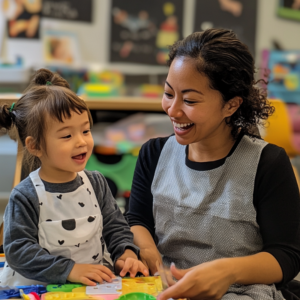Hey there, incredible parent. Yes, I’m talking to you.
In a moment where educational supports feel shaky and routines are disappearing, I want to remind you of something powerful: your presence, your love, and your steady commitment are the strongest constants in your neurodiverse child’s life.
Summer can feel overwhelming, especially when we know how easily progress can unravel without structure. Those studies about “summer slide” hit differently when you’re parenting a child with unique learning and emotional needs. But here’s the truth: you don’t have to recreate school. You just need intention, connection, and a few solid tools to create meaningful moments that nurture growth.
This is your neurodiverse summer learning roadmap—and this season, we’re taking back control together. Below, you’ll find practical, age-based strategies to help build structure, emotional connection, and real-world learning—at home, one real day at a time (including the messy ones!).

I've walked alongside hundreds of families just like yours, and I've gathered age-specific strategies that actually work in real homes, with real kids, during real summer days (including the messy ones!).
Your little one thrives with predictability and hands-on experiences. Let's build on that:
1. Make the invisible, visible – Visual schedules aren't just helpful; they're transformative. Whether you use the Choiceworks app or simply print pictures representing each part of your day, seeing what comes next reduces anxiety and builds confidence. Bonus: let your child help create or decorate it!
2. Merge regulation with reading – Notice how your child focuses better when their body feels "just right"? Try reading while gently swinging, or offer a weighted stuffed animal during story time. For dyslexic learners, audiobooks paired with the physical text can open worlds while reducing frustration.
3. Play IS therapy – Those Occupational Therapy (OT) goals don't need fancy equipment. When your child helps mix cookie dough, they're working on hand strength. That backyard obstacle course? Sequencing, motor planning, and balance. Trust your instincts here—you already know what engages them.

4. Screen time with purpose – Apps like HOMER and Khan Academy Kids adapt to your child's pace while teaching real skills. Even 15 minutes a day builds confidence and competence. Apps are not one size fit all, so you may want to try different ones when your chid is not using it or becomes frustrated. One of my favorite podcast guest Elizabeth Milodov shared great tips on how to enjoy screentime with your kids while gently setting up rules that keep them safe and sane.
5. Name it to tame it – Those big emotions need vocabulary. Simple check-ins using mood meters or Zones of Regulation give your child language for their internal experience—perhaps the most important skill of all.
Resources that have your back:
The tween years—when they need both roots and wings. This delicate balance becomes even more important for neurodiverse kids:
1. Follow their fascinations – Does your child hyperfocus on robots, history, or art? This isn't distraction—it's an opportunity. Help them design a summer project around their passion. The motivation skyrockets while they practice planning, executing, and problem-solving.
2. External brains for developing executive function – Visual timers, color-coded calendars, or the Brili Routines app become their training wheels toward independence. Start with small chunks of time they manage themselves.
3. Honor the emotional rollercoaster – Puberty plus neurodiversity can create the perfect storm. Create a sensory-friendly cool-down space before it's needed. Remember: meltdowns aren't manipulation; they're communication. Your calm presence during turbulence teaches more than words ever could.
4. Life skills ARE academic skills – Cooking teaches fractions and chemistry. Family budgeting practices real-world math. Pet care builds responsibility and routine. These aren't "extras"—they're essential life skills.

5. Find their people – Social connections matter deeply, even when they're challenging. Look for small-group settings with built-in structure and shared interests—robotics clubs, gaming groups, or specialized camps where differences are normalized.
Resources worth bookmarking:
The future is approaching, but let's not miss the precious now. Your teen is discovering who they are—with strengths that will serve them lifelong:
1. Self-advocacy as a superpower – Practice articulating needs in every day situations now, so it becomes natural later. Role-play requesting accommodations/modifications or assistance in different situations. For example: My son is autistic and it's challenging for him to ask for a straw when we go out to eat. I help him by getting him to ask for the straw instead of asking for him. Have a conversation with your child about what accommodations are working and which ones are not working. This is where you will discover if the school is actually supporting your child in class. Document what works for future 504 and Individual Education plans.

2. Real-world experience – Whether it's a structured volunteer position, part-time job, or entrepreneurial venture based on their interests, meaningful work builds identity and practical skills simultaneously. This is a great time to reach out to your states Rehabilitation Assistance Services (RSA). They will be able to support with summer work experiences.
3. Navigation tools for what's next:
4. Mental health comes first – Anxiety and burnout affect neurodiverse teens in high numbers. Create tech boundaries that make sense for your family. Nurture the idea of rest as productive. Consider sensory-friendly movement like swimming or hiking for stress management.
5. Find their voice – Invite them into advocacy work alongside you. Understanding their rights and the larger context of neurodiversity can transform "different" from a burden into a source of pride and purpose.
Resources that open doors:

Some days will flow beautifully. Other days might be about just making it through. That’s okay. When you pause to check in, read together, or help your child name a big feeling, that counts.
✨ Start Here:
You are the expert on your child. They see you showing up, and that is powerful.
Remember to take care of yourself too—you matter. Rest when you need it. Ask for help when you can. Celebrate what’s working, and release what’s not.
💛 You’ve got this—and when it feels like you don’t, you’ve got us.